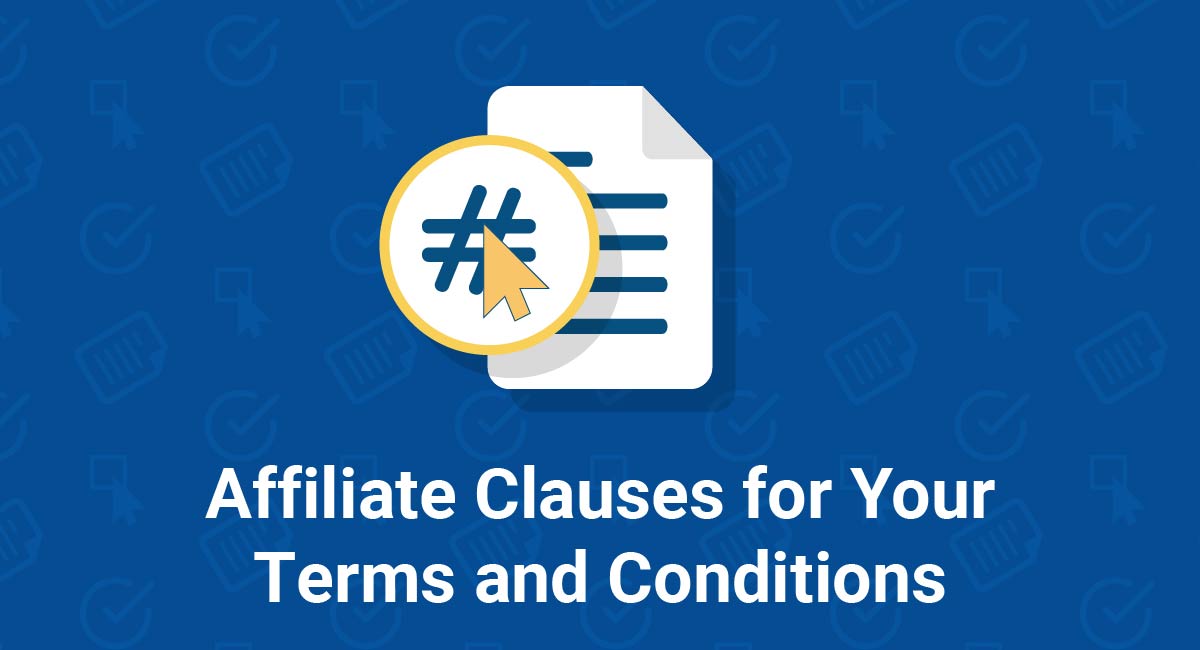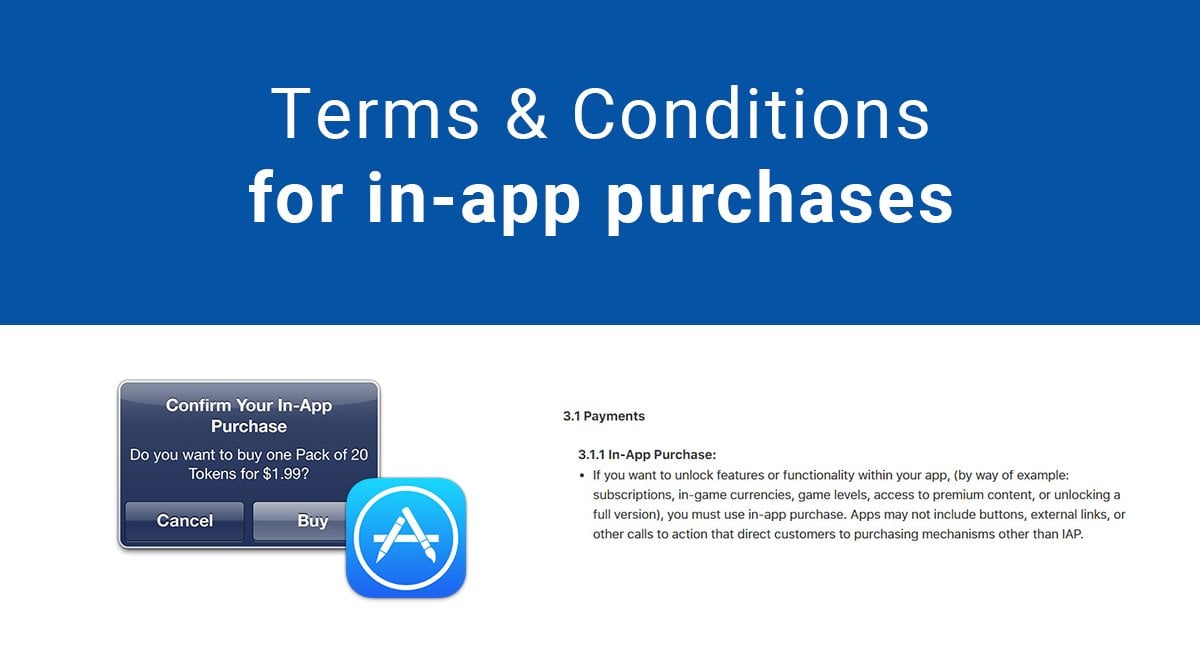Every affiliate marketer should know that you must disclose the fact that you earn a commission from affiliate links on any page where you display them.
For added transparency, and legal diligence, we recommend inserting an "affiliate clause" into your Terms and Conditions to ensure that your visitors understand that you will be earning a commission from links on your site.
In this article, we'll be answering some questions about affiliate marketing disclosure requirements, and looking at how you can make an affiliate disclosure in your Terms and Conditions, with some important extra information for Amazon Affiliates. A T&C document is also known as a Terms of Use or Terms of Service.
Our Terms and Conditions Generator makes it easy to create a Terms and Conditions agreement for your business. Just follow these steps:
-
At Step 1, select the Website option or the App option or both.
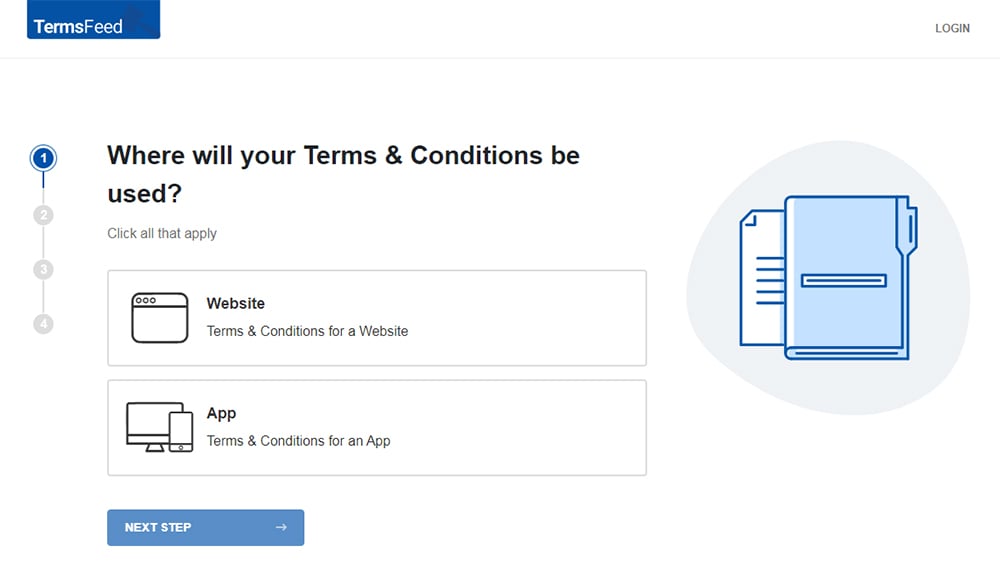
-
Answer some questions about your website or app.
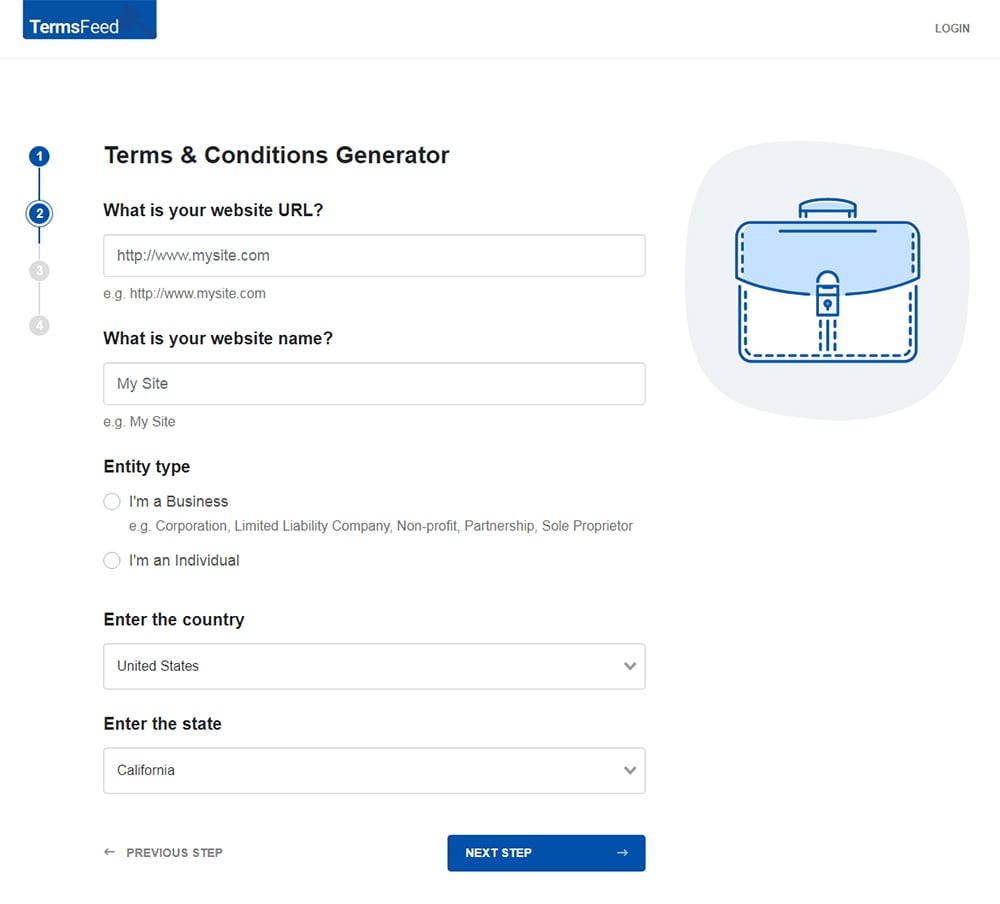
-
Answer some questions about your business.
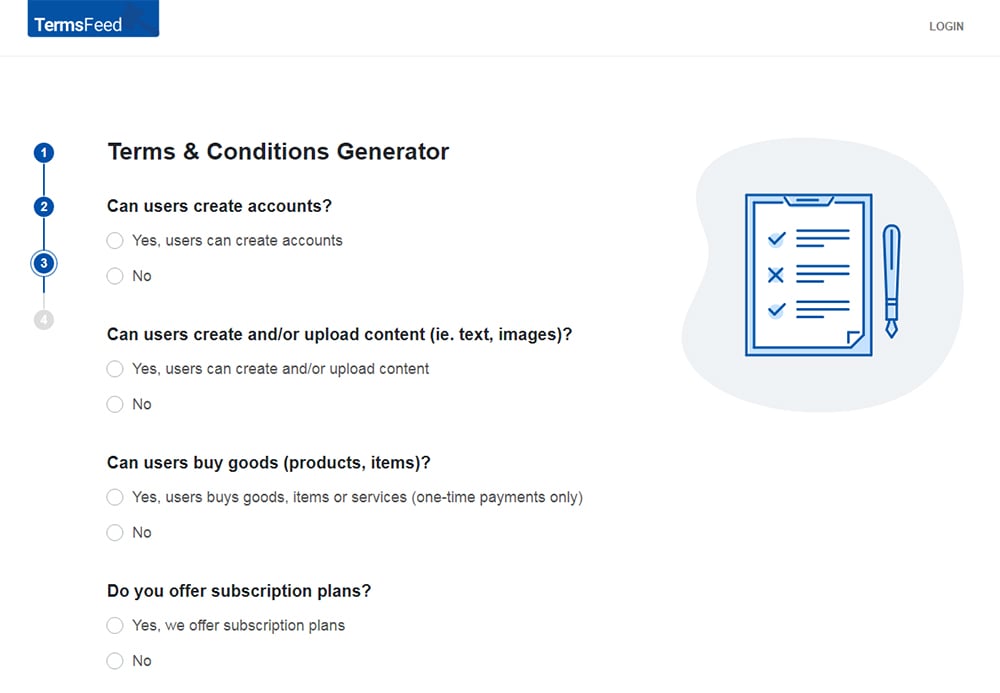
-
Enter the email address where you'd like the T&C delivered and click "Generate."
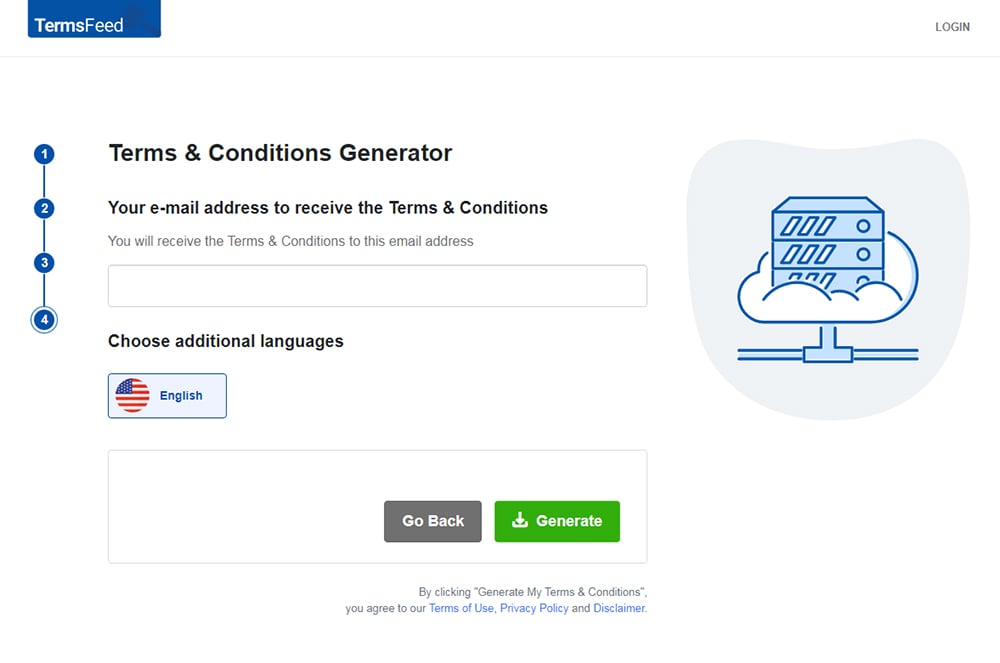
You'll be able to instantly access and download the Terms & Conditions agreement.
- 1. Affiliate Clauses: Frequently Asked Questions
- 1.1. Why Do I Have to Make a Disclosure?
- 1.2. Where Do I Need to Display My Disclosure?
- 1.3. What are the Rules on Disclosures?
- 1.4. Do I Have to Make a Disclosure Within a Terms and Conditions Agreement?
- 1.5. Do I Need to Specify Which Affiliate Programs I Use?
- 2. Example Affiliate Disclosures for Your Terms and Conditions
- 2.1. Amazon Associates and Influencers
- 3. Summary
Affiliate Clauses: Frequently Asked Questions
Why Do I Have to Make a Disclosure?
In the United States, the Federal Trade Commission (FTC) regulates how marketers receive commissions from brands. There are substantially similar laws in most other markets, including the European Union, the United Kingdom, and Canada.
The FTC requires that you disclose any "material connection" you have to a brand whose products or services you "endorse." This disclosure is necessary because your use of affiliate links constitutes a form of marketing for the products you endorse.
The concepts of "material connection" and "endorsement" can take many forms, but it will suffice to say that these concepts include the use of affiliate links.
Even if you are giving a product a negative review, you'll need to make a disclosure if you use affiliate links or have any other material connection to the brand in question.
Where Do I Need to Display My Disclosure?

We recommend that you make an affiliate disclosure within your Terms and Conditions agreement, but this isn't the only place you'll need to make it.
You need to make a disclosure whenever you endorse a product. A disclosure does not necessarily have to appear alongside every affiliate link, but it should appear on every page on which you have included affiliate links.
In addition to pages on your website, you should be making disclosures whenever you make an endorsement via other media, including:
- Facebook, Twitter, Instagram, and other social media
- Videos on YouTube and other platforms
- Guest posts on other people's blogs
What are the Rules on Disclosures?
The FTC's rules provide a good basis for understanding disclosures. These rules are similar across most jurisdictions, but bear in mind that local laws may vary.
- Make a disclosure on every page containing an affiliate link
- Make sure your disclosures are unambiguous, clear, and conspicuous
- Disclosures must be "above the fold" (i.e. visible on a web page without the need to scroll down)
- Make sure your disclosures aren't buried in a block of text
Not all of these rules apply when you are creating affiliate clauses within your Terms and Conditions.
For example, on a web page containing affiliate links, you'll need to make your disclosure "above the fold." In your Terms and Conditions, you can place your affiliate clauses wherever you want.
However, the core principles of the FTC's rules, including that disclosures must be unambiguous, clear, and conspicuous, do apply to your Terms and Conditions.
For more information, see our article FTC Requirements for Influencers.
Do I Have to Make a Disclosure Within a Terms and Conditions Agreement?

No law states that you must include an affiliate disclosure within your Terms and Conditions agreement. In fact, no law states that you need to have a Terms and Conditions agreement at all (unlike a Privacy Policy, which is required by law).
Some affiliate marketers provide their disclosure as a separate web page and provide a link to this page at their site's footer, alongside links to other legal documents such as their Privacy Policy.
Here's an example from Meditation Life Skills:

This approach should be fine, with a few caveats:
- You'll need to make a disclosure on each page on which you display an affiliate link anyway. You don't need to link to a separate page containing a longer disclosure.
- If you have a Terms and Conditions agreement, you should include all relevant disclosures and disclaimers within this document, including your affiliate disclosure.
- Even though it's not required, you should have a Terms and Conditions agreement. There are several legal benefits to having a Terms and Conditions agreement in place.
Do I Need to Specify Which Affiliate Programs I Use?
By law, you don't have to specify which affiliate programs you use, unless it would affect the credibility of the endorsement you are making. In most circumstances, it should suffice to say that you are receiving a commission for purchases made via your affiliate links.
The exception is where you are required to specify the affiliate program by the program's owner. For example, members of the Amazon Associates Program and Amazon Influencers Program are required to use specific phrasing, as we'll see below.
Example Affiliate Disclosures for Your Terms and Conditions

Remember that the FTC requires disclosures to be unambiguous, clear, and conspicuous. As long as you fulfill the FTC's requirements, the wording you use is up to you.
Note, however, that certain affiliate networks, such as Amazon, have specific wording that you must use for your disclosures.
Let's examine how some websites disclose their use of affiliate links in their Terms and Conditions agreements.
Here's an example from Ziff Davis:

Notice how Ziff Davis makes its disclosure stand out. This would appear to comply with the FTC's requirement that disclosures are "conspicuous" (so long as there is also a conspicuous disclosure on the same page as any endorsements).
Here's another example from Mumsnet:

Note that Mumsnet uses this opportunity to reassure its users that its use of affiliate links does not affect its writers' objectivity.
Amazon Associates and Influencers
If you promote Amazon products as part of the Amazon Associates Program or Amazon Influencers Program, Amazon requires you to disclose this using specific phrasing, as set out in the Amazon Associates Program Operating Agreement:

Amazon requires that you make the following disclosure "on your site" or "any other location" where you use Amazon affiliate links:
"As an Amazon Associate I earn from qualifying purchases."
You should use this exact phrasing in your Terms and Conditions and wherever else you need to make a disclosure.
Note that Amazon allows you to use a "substantially similar statement previously allowed" under its Amazon Associate Program Operating Agreement. This refers to a previous version of this disclosure:

So, if you wish, you could use the disclosure previously permitted by Amazon:
"[Insert your name] is a participant in the Amazon EU Associates Programme, an affiliate advertising programme designed to provide a means for sites to earn advertising fees by advertising and linking to [insert applicable site name (Amazon.co.uk/Amazon.de/Amazon.fr/Amazon.it/Amazon.es)]."
Summary
Including your affiliate disclosure in your Terms and Conditions is an excellent way to ensure that it is present on your website. It's also good for your Terms and Conditions to include all the legal information relevant to your business (together with your Privacy Policy).
Ensure that your affiliate disclosure also appears on any page containing an affiliate link and that you make a disclosure in some form when making endorsements on social media.
Amazon Affiliates must be careful to use the exact words required under the Amazon Affiliates Program.

Comprehensive compliance starts with a Privacy Policy.
Comply with the law with our agreements, policies, and consent banners. Everything is included.
